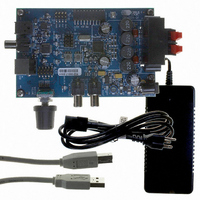CRD4525-Q1 Cirrus Logic Inc, CRD4525-Q1 Datasheet - Page 40

CRD4525-Q1
Manufacturer Part Number
CRD4525-Q1
Description
REFERENCE BOARD FOR CS4525 PWM
Manufacturer
Cirrus Logic Inc
Series
Popguard®r
Specifications of CRD4525-Q1
Amplifier Type
Class D
Output Type
2-Channel (Stereo)
Max Output Power X Channels @ Load
15W x 2 @ 8 Ohm
Voltage - Supply
12 V ~ 18 V
Operating Temperature
0°C ~ 70°C
Board Type
Fully Populated
Utilized Ic / Part
CS4525
Lead Free Status / RoHS Status
Contains lead / RoHS non-compliant
Other names
598-1586
40
6.1.4.12 Thermal Foldback
The CS4525 implements comprehensive thermal foldback features to guard against damaging thermal
overload conditions. Thermal foldback is similar to the thermal limiting described on
features attenuate the output signal in response to thermal warnings conditions; however, thermal fold-
back will attenuate as a function of how long thermal warning has been active whereas thermal limiter
always limits by a constant amount. Also, the thermal foldback feature will deactivate once the thermal
warning condition ceases while the thermal limiter will remain active once triggered until the RST pin is
driven low.
The thermal foldback algorithm begins limiting the volume of the digital audio input to the amplifier stage
as the junction temperatures rise above the maximum safe operating range specified by the thermal warn-
ing trigger point listed in the
the output power capability of the device, thereby allowing the temperature to reduce to acceptable levels
without fully interrupting operation. As the device cools, the applied attenuation is gradually released until
a new thermal equilibrium is reached or all applied attenuation has been released thereby allowing the
device to again achieve its full output power capability.
Attenuation applied due to thermal foldback reduces the audio output level in a linear manner.
below demonstrates the foldback process.
1
2
3
When the junction temperature crosses the thermal warning threshold, the foldback attack delay timer is started.
When the foldback attack delay timer reaches t
temperature is above the thermal warning threshold, the output volume level is lowered by 0.5 dB and the foldback
attack timer is restarted.
The junction temperature is checked after each foldback attack timer timeout, and if necessary, the output volume level
is lowered accordingly.
If the junction temperature is found to be below the thermal warning threshold, the foldback attack timer is restarted
once again, but the output volume level is not altered. The foldback algorithm then proceeds to step 3.
The junction temperature is checked once again after the next foldback attack timer timeout. If it has remained below the
thermal warning threshold since the last check, the device will begin to release any attenuation applied as a result of the
foldback event. Setting the LockAdj bit will prevent the device from removing the applied attenuation when the thermal
overload condition has cleared.
If the junction temperature crosses the thermal warning threshold again, the foldback algorithm will once again enter
step 1.
Thermal Warning
Threshold
Foldback Attack Delay
AttackDly[1:0]
PWM Power Output Characteristics
1
t
delay
Figure 18. Foldback Process
2
t
delay
delay
2
seconds, the junction temperature is checked. If the junction
t
delay
2
t
delay
2
t
delay
table on
3
page
20. This effectively limits
page 39
1
CS4525
in that both
DS726PP3
Figure 18


















